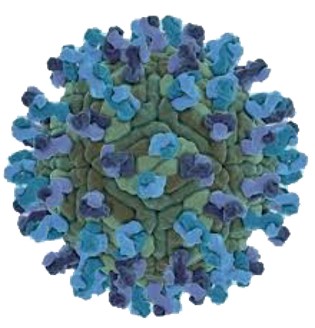Information for patients and visitors
Chickenpox and shingles
Chickenpox is an acute, infectious disease caused by the varicella-zoster virus and is most common in children under 10 years old. This virus, if re-activated in a person who has had chickenpox previously, can cause shingles (herpes zoster).
Shingles tends to be more prevalent in adults.
It is not possible to develop shingles from exposure to a person with chickenpox. It is possible however to develop chickenpox as a result of exposure to a person with shingles.
Is shingles the same as chickenpox?
The same virus causes these illnesses. Once you have had chickenpox the virus never leaves your body, instead it rests in your nerves. If you become run down (e.g. stress) the virus may wake up again. This second stage is called shingles.
Shingles may be very painful or cause no discomfort, just a rash of blisters on the back, buttocks, under breasts and around the eyes.
Transmission
Chickenpox is highly contagious, infecting up to 90% of the people who come into contact with the disease. Transmission is through direct person to person contact, airborne droplet infection or through contact with infected articles such as clothing and bedding.
Incubation period
Is from 10 to 21 days. The most infectious period is from 1 to 2 days before the rash appears but infectiousness continues until all the lesions have crusted over (usually about 5 to 6 days after the onset of the illness).
Symptoms of chickenpox
Chickenpox may initially begin with cold like symptoms followed by a high temperature and an intensely itchy, vesicular (fluid-filled, blister-like) rash. Clusters of vesicular spots appear over 3-5 days, mostly over the trunk and more sparsely over the limbs. The severity of infection varies and it is possible to be infected but show no symptoms.
Infectious period
People are infectious 3 days prior to the rash appearing up until the rash has dried up and scabbed over.
Can you catch chickenpox twice?
It is very rare to catch chickenpox twice. Once you have had chickenpox once you can assume that you will never catch chickenpox again.
Visiting
If you have never had chickenpox or are unsure, then you should not visit someone with chickenpox. If you have visited by mistake you could show signs of chickenpox within 10-21 days after your visit.
What precautions will be taken if I have chickenpox during my Hospice stay?
To reduce the risk of other patients catching chickenpox you will be cared for in a side room with the door closed.
Staff who care for you will wear disposable gloves and aprons to stop the infected fluid in your spots reaching non-immune patients. This protective clothing will be removed after care and disposed of and the staff member will wash their hands and dry them thoroughly to reduce the risk of cross infection.
Masks are not recommended as the chickenpox virus is small and will pass straight through the mask.
How can you catch shingles?
You do not catch shingles; the virus is already present in your body after you have had chickenpox. Shingles often occurs when you are run down and vulnerable
You cannot catch shingles from someone who has shingles.
However the shingles blisters contain fluid carrying the chickenpox virus.
If you know you have not had chickenpox or are unsure avoid direct contact with a shingles rash. Shingles is not passed through the air.
Care should be taken to avoid contact with shingles fluid on linen or personal clothing. Clothes and other linen should be laundered at the highest temperature to remove the virus.
Shingle remain infectious until the rash is dry and scabbed over.
Treatment of chickenpox and shingles
There is no specific treatment for chickenpox and shingles. It is a viral infection which will not respond to antibiotics. Treatment should be based on reducing symptoms such as fever and itchiness. People at higher risk of developing serious complications may be give antiviral drugs such as Acyclovir. These cannot kill the virus but they can help to stop it multiplying.
Antiviral medicine may help to reduce the severity, particularly if taken in the early stages of the condition.

